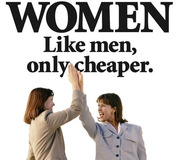


 By VennerRoad, 25th Jul 2017
By VennerRoad, 25th Jul 2017
The recent revelation that the BBC has been paying its biggest male names more than its females has reignited the gender pay gap lie.

An ironic gender pay gap cartoon.
If you keep hearing that women make only 77c on the male dollar, that is with good reason: some liars never give up.
The gender pay gap is one of the most persistent myths, nay, lies, pushed by what Donald Trump calls the special interests, in this case not that of the monied aristocracy and their paid agents, but of third wave feminism. This is not to say there was never any sort of gender pay gap in history; at one time women were indeed paid less than men, but there were bona fide reasons for this. Before we dive into the latest manufactured controversy, we need to explore the historical background.
If we go back in time far enough, nobody was paid anything because money did not exist. While we may complain about the world being a cruel place, it was even worse for the ancients. Leaving aside the Biblical three score years and ten, most people did not live anything like that long. Hard as life was for men, it could be harder for women, and often was. The most dangerous time for a woman was childbirth; this article by the charmingly named Miss Cellania points out that at one time childbirth was regarded as so dangerous that a woman would make her will as soon as she realised she was pregnant.
Women of child-bearing age were especially valued – contrary to feminist dogma – so customs and social mores were developed to protect them, especially but not inclusively for those higher up the food chain. The lot of ordinary women during especially the Industrial Revolution was particularly hideous, but again, men’s lives were no picnic either.
Marriage is a legal contract, and in most societies – Western and non-Western – a man was responsible for his wife and for her debts as well as for any offspring. Because of this, men went “out to work” while their wives stayed at home with the young. Of course, many women worked too, sometimes with their husbands, on farms and in small businesses.
With the virtuous circle of technology and the accumulation of capital, societies were able to afford to educate girls as well as boys, and eventually the privilege of an education became first a right and then a duty. Improvements in medicine and public health meant both women and their offspring were less likely to die in childbirth. Heavy machinery meant that jobs which were largely unsuited to women because of their lesser strength were opened up to them, although even today women are seldom if ever seen digging up the street, and if a woman works on a building site it is usually doing the paperwork in a portacabin.
In the Nineteenth Century, the professions began to open up to women; two major strongholds were teaching and nursing – the caring professions – but by the 1930s, the only barriers women faced in most professions were the same as faced by men, financial; there were for example literally hundreds of lady doctors in the Greater London area alone.
Up until the 1960s, a man was still expected to provide for his wife and family, but by this time women were entering higher education in droves, and many were expecting to have careers instead of mere jobs or earn pin money doing part time work as housewives. The 1960s saw too “the pill”, the first time in history contraception was properly available to women without celibacy, unmentionable side-effects or unpleasant consequences. Marriage also waned in popularity; best not to mention either Stonewall or Wolfenden.
By this time, a mere handful of professions had any meaningful barriers for women, but ordinary working women were still usually paid lower rates for the same or essentially the same work. In the UK, the Equal Pay Act, 1970 made it a criminal offence for employers to pay women less; similar legislation had been enacted in the United States seven years earlier. This begs the question, how can there be a gender pay gap if differential rates are illegal? An equally valid question is if women were paid less than men for the same work, why would any private sector employer in his right mind employ men when he could employ women for less?
The reality is that this gender pay gap is entirely imaginary; the work debunking it was carried out in the 1970s and 80s. Two men in particular – Walter Williams and Thomas Sowell – have utterly refuted it. Williams is currently * a professor of economics; Sowell is a long time research fellow with the prestigious Hoover Institution. Although their studies concerned race for the most part, Sowell has pointed out time and time again that if you take any two populations by any criteria you will never find equality of income. This short clip from 1981 shows him putting feminist attorney Harriet Pilpel in her place.
There are many reasons why women earn less overall than men, the biggest is of course that when a couple start a family, she not he becomes pregnant, which necessitates taking time out of the workforce. Some women can do it all and have it all, but most prefer to take time out, five, ten years, perhaps more. Is it reasonable to expect a woman who takes such a career break to be earning as much as a man who does not?
Now we come to the high earners, with few exceptions, almost all the really high earners are men. Outside of extremely successful musicians and the film world, how many high earning women are there? Doctors and academics are generally members of the top 1%, but those earning mega-bucks in business and related fields are nearly all men. How many of the world’s top 500 companies were started by women? Even in the modern age, there are pitifully few female entrepreneurs. This isn’t sexism or any such chimera, it is simply the way human beings are.

Chris Evans
Before we turn to the BBC, let us mention soccer – the men’s game and the women’s game. The England Women’s Team has been more successful than the Men’s, certainly this Millennium, but who notices? The men’s game sees players being paid ludicrous sums; women professional players make a living. One would have thought if the choice was watching 22 men in shorts running up and down for 90 minutes trying to kick a ball into the back of a net or 22 women doing the same thing, the latter would prevail. Curiously though, red-blooded males prefer to watch the men’s game, as do women. In other words, the “obscene” money paid to Premier League soccer players is purely a matter of market forces. By the same token, top rap musicians out earn classical musicians by an order of magnitude. Obscene as this may seem to a graduate of the Guildhall School of Music, their respective remunerations does not constitute a value judgement, at least not in the aesthetic sense.
Finally, we come to the BBC, the big question here is not why are 62 of the top 96 earners men, but why would any employer in his right mind pay Chris Evans two and a quarter million pounds a year? Because that is what he is “worth”. Something that needs to be pointed out, even though it should be obvious, is that these presenters are not on Civil Service pay grades or the salaries paid to people lower down the food chain in the private sector, they are the men and women at the very top, some of whom may be head hunted, and who negotiate their salaries either individually or through their managements. A top commercial lawyer may do the same.
So who are the wimmin behind the gender pay gap lie, and what do they want? One of the loudest voices in the UK is the Fawcett Society, which styles itself the UK’s leading charity for women’s equality at home, at work and in public life. Here is a fragment of code from its website; the term Invalid argument says it all.
In 2015, the Fawcett Society received £43,000 from the Barrow Cadbury Trust and £63,500 from the Joseph Rowntree Charitable Trust as well as other donations. This money is used to promote the lie of the gender pay gap, to campaign for laws to equalise the pay of men and women, and for other facile nonsense, like the promotion of the rape culture myth.
The Fawcett Society’s reaction to the BBC revelations is sadly typical; tinkering with the pay of people earning six and seven figure salaries does absolutely nothing to benefit those who really need help, in particular women, men, families, who are struggling under the current manufactured austerity. Indeed, like the vast majority of the second type of feminist – the professional victims - the wimmin who run the Fawcett Society are doing very nicely thank you off the largesse of the rich while whining about how oppressed they are.
One of the major complaints made by feminist airheads about employment and the mythical pay gap is that there are so few women in STEM fields. How do they propose to solve this problem, make employers hire women at the point of a gun, coerce women into pursuing careers for which they are unsuited or for which they have no aptitude?
One suggestion is to lower standards, something the race hustlers advocate too. What would that result in? Consider an extreme example, the Royal Marines and other elite services have extremely high standards for physical fitness, endurance, and other qualities. In 2015, 381 men and 19 women began training at Fort Benning, Georgia to become US Army Rangers. After the first four days, 8 women and 184 men remained. By the end of the course, all the women had failed. Lowering standards may benefit the egos of a few women, but this is no way to run an army.
Similarly, enforcing a ludicrous gender parity in other fields will result in companies being run by people who don’t know what they are doing. Ask yourself this, if you were to undergo heart surgery, would you want the operation to be performed by a woman (or anyone) who had qualified due to lowering the standard, or would you want the best in the field?
There can be little doubt that the members of the Fawcett Society and other gender zealots know what the score is, they know the gender pay gap is contrived, they know that women prefer to work in some professions rather than others, and they know the statistics they spout have either no basis in fact or are torn out of context. They know, and they don’t care.
* Walter Williams died December 2, 2020 aged 84.
To Wikinut Articles Page